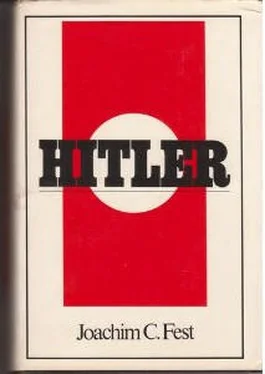Joachim Fest - Hitler
Здесь есть возможность читать онлайн «Joachim Fest - Hitler» весь текст электронной книги совершенно бесплатно (целиком полную версию без сокращений). В некоторых случаях можно слушать аудио, скачать через торрент в формате fb2 и присутствует краткое содержание. Город: New York, Год выпуска: 1974, ISBN: 1974, Издательство: A Harvest Book, Жанр: Биографии и Мемуары, на английском языке. Описание произведения, (предисловие) а так же отзывы посетителей доступны на портале библиотеки ЛибКат.
- Название:Hitler
- Автор:
- Издательство:A Harvest Book
- Жанр:
- Год:1974
- Город:New York
- ISBN:9780151416509
- Рейтинг книги:5 / 5. Голосов: 1
-
Избранное:Добавить в избранное
- Отзывы:
-
Ваша оценка:
- 100
- 1
- 2
- 3
- 4
- 5
Hitler: краткое содержание, описание и аннотация
Предлагаем к чтению аннотацию, описание, краткое содержание или предисловие (зависит от того, что написал сам автор книги «Hitler»). Если вы не нашли необходимую информацию о книге — напишите в комментариях, мы постараемся отыскать её.
Index. Translated by Richard and Clara Winston. A Helen and Kurt Wolff Book
Hitler — читать онлайн бесплатно полную книгу (весь текст) целиком
Ниже представлен текст книги, разбитый по страницам. Система сохранения места последней прочитанной страницы, позволяет с удобством читать онлайн бесплатно книгу «Hitler», без необходимости каждый раз заново искать на чём Вы остановились. Поставьте закладку, и сможете в любой момент перейти на страницу, на которой закончили чтение.
Интервал:
Закладка:
His first brush with political reality took a similar course. Once again, despite his feelings of alienation, revolutionary ideas had no attraction for him. Instead he once again revealed himself a partisan of the establishment, paradoxically defending a reality that he simultaneously repudiated. Rejected himself, he seemingly canceled the humiliation by taking over the cause of the society that had rejected him. Beneath this psychological mechanism was concealed one of the lines of fracture in Hitler’s character. He himself has related how as a construction worker he would go off to one side during the noon lunch break to drink his bottle of milk and eat his piece of bread. And whatever we may or may not believe in this story, his “extremely” irritated reaction to the attitude of his fellow workers was consonant with a basic element in his personality: “They rejected everything: the nation as an invention of the ‘capitalistic’… classes; the Fatherland as an instrument of the bourgeoisie for the exploitation of the working class; the authority of the law as a means for the repression of the proletariat; school as an institution for breeding slave material, but also for training the slavedrivers; religion as a means for stupefying the people intended for exploitation; morality as a sign of stupid, sheeplike patience, etc. There was absolutely nothing at all that was not dragged through the mire of horrible depths.” 24
Significantly, the series of ideas that he defended against the construction workers—nation, fatherland, authority of the law, school, religion, and morality—contains virtually the complete catalogue of standards for bourgeois society, against which he himself was at this time conceiving his first resentments. It is precisely this divided relationship that will come to the fore repeatedly on the most diverse planes throughout his life. It will reappear in the political tactics of constantly seeking alliances with the despised bourgeois, and in the ritualistic formality—verging on the ridiculous—that prompted him to greet his secretaries by kissing their hands, or at the afternoon teas in the Führer’s headquarters to serve them personally their cream cake. In all vulgarity he cultivated the airs of a “gentleman of the old school.” His manners were his way of demonstrating that he had achieved a desired social affinity; and if there is anything in the picture of young Hitler that betrays specifically Austrian traits, it must be this special status consciousness with which he defended the privilege of being bourgeois. In a society whose craze for titles tended to assign a social ranking to every activity, he wanted at least to be a Herr, a gentleman. It did not matter that his life was narrow and gloomy as long as he could claim this distinction. This was why he stayed away from the artistic and political oppositions of the period. Much of his outward behavior, his language and his clothing, and his ideological and aesthetic choices as well can be most plausibly explained as the effort to conform to the bourgeois world, which he admired uncritically, even to its presumptions. Social disdain he felt to be far more painful than social wretchedness; and if he despaired, it was not from the flawed order of the world, but from the insufficient part granted to him to play in it. He was therefore very careful to avoid any dispute with society; he wanted only to be reconciled to it. Staggered by the grandeur and glamour of the metropolis, wistfully standing outside locked gates, he was not revolutionary. He was merely lonely. No one seemed less destined to be a rebel than he.
The Granite Foundation
D’où vient ce mélange de génie et de stupidité?
RobespierreNear his room on Felberstrasse there was a tobacco shop that sold periodicals, including one highly popular magazine devoted to racial anthropology. Its title page carried the headlines: “Are you blond? Then you are a creator and preserver of civilization. Are you blond? Then you are threatened by perils. Read the Library for blonds and advocates of Male Rights.” [1] Mannesrechtler —a coinage based on Frauenrechtler. Its present-day equivalent might be “Men’s Lib.”—TRANS.
Its editor was a defrocked monk with the arrogated name of Jöorg Lanz von Liebenfels. The magazine, which he had named Ostara after the Germanic goddess of spring, proclaimed a doctrine, as deranged as it was dangerous, of the struggle between heroic men whom he called Asings or Heldings, and dwarfish, apelike creatures called Afflings or Schrattlings. Some wealthy industrialist backers had made it possible for Lanz von Liebenfels to buy the castle of Werfenstein in Lower Austria. From this headquarters he directed the formation of a heroic Aryan league that was to form the advance guard of the blond and blue-eyed master race in the coming bloody confrontation with the inferior mixed races. Under the swastika flag, which he had already raised over his castle in 1907, he promised to counter the socialistic class struggle by race struggle “to the hilt of the castration knife.” Thus early he called for a systematic program of breeding and extermination: “For the extirpation of the animal-man and the propagation of the higher new man.” Along with genetic selection and similar eugenic measures, his platform included sterilization, deportations to the “ape jungle,” and liquidations by forced labor or murder. “Offer sacrifices to Frauja, you sons of the gods!” he wrote. “Up, and sacrifice to him the children of the Schrattlings.” In order to popularize the Aryan idea, he suggested racial beauty contests.
Hitler had missed some of the older issues of the magazine, and this gave him a pretext for visiting Lanz several times. He left an impression of youth, pallor, and modesty. 25
The importance of this rather ludicrous founder of an order does not consist in anything he suggested to or did for Hitler but in the symptomatic place he occupied: he was one of the most eloquent spokesmen of a neurotic mood of the age and contributed a specific coloration to the brooding ideological atmosphere, so rife with fantasies, of Vienna at that time. To say this both describes and delimits his influence upon Hitler. One might say that Hitler did not so much absorb the man’s ideology as catch the infection that underlay it.
From this and other influences, such as the newspaper articles and cheap pamphlets that Hitler himself mentioned as early sources of his knowledge, some scholars have concluded that his world view was the product of a perverted subculture opposed to bourgeois culture. And in fact the plebeian hatred for bourgeois mores and bourgeois humanity repeatedly erupts in his ideology. The dilemma, however, consisted in the fact that this culture was in a way permeated by its subculture and had long ago become a blasphemy of everything it was founded on. Or, to put the same thought in a different way, the subculture that Hitler found expressed by Lanz von Liebenfels and others of his ilk in turn-of-the-century Vienna was not the negation of the prevailing system of values but only its rather battered and sordid image. Turn where he might in his craving for ties with the bourgeois world, he came upon the same notions, complexes, and panicky fears that were expressed in the cheap pamphlets, only in a more sublimated and respectable form. He did not have to abandon a single one of the trivial ideas that had helped him to achieve his initial orientation in the world. Everything he had picked up, with reverent astonishment, in the speeches of the most influential politicians of the metropolis, seemed familiar to him. And when he sat in the upper balcony of the Opera House and listened to the works of the most celebrated composer of the era, he encountered only the artistic expression of the familiar vulgarities. Lanz, the Ostara pamphlets, and the trashy tracts merely opened for him the rear entrance into the society he wanted to belong to. But, rear or not, it was an entrance.
Читать дальшеИнтервал:
Закладка:
Похожие книги на «Hitler»
Представляем Вашему вниманию похожие книги на «Hitler» списком для выбора. Мы отобрали схожую по названию и смыслу литературу в надежде предоставить читателям больше вариантов отыскать новые, интересные, ещё непрочитанные произведения.
Обсуждение, отзывы о книге «Hitler» и просто собственные мнения читателей. Оставьте ваши комментарии, напишите, что Вы думаете о произведении, его смысле или главных героях. Укажите что конкретно понравилось, а что нет, и почему Вы так считаете.





![Traudl Junge - Hitler's Last Secretary - A Firsthand Account of Life with Hitler [aka Until the Final Hour]](/books/416681/traudl-junge-hitler-s-last-secretary-a-firsthand-thumb.webp)






